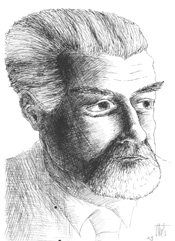Konrad Lorenz |
Konrad Lorenz was one of the founders of ethology, a new biological science that studies animal behavior.
The most famous scientific contribution of Konrad Lorenz is the discovery of “imprintig”. Imprinting is a special kind of learning, fast and relatively irreversible, that can occur only in a very brief period of time. For example, small ducks finished to leave the egg, follow and stay socially bound to the first moving object they see, that normally is its mother. Lorenz writted also some famous books related to ethology. For example, “King Solomon's ring” or “On aggression”. In 1973, Lorenz won the Nobel prize of physiology and medicine, shared with Karl von Frisch and Nikolaas Tinbergen. Lorenz continued working and writing books until his death at the age of 86 (1989). This Lorenz picture has been made by Sergi Quiñones Oliva (Othello). More information: |
 Konrad Zacharias Lorenz was born on november 7, 1903, at Vienna, Austria. Even being a child, Lorenz collected animals and observed its behavior. He studied medicine at Vienna University and gained a doctorate in zoology from the University of Munich in 1936. During World War II, Lorenz served as a doctor in the German army, but became a prisoner of war in 1942, and served again as a doctor under the Russian authorities until 1948, when he was repatriated to Austria.
Konrad Zacharias Lorenz was born on november 7, 1903, at Vienna, Austria. Even being a child, Lorenz collected animals and observed its behavior. He studied medicine at Vienna University and gained a doctorate in zoology from the University of Munich in 1936. During World War II, Lorenz served as a doctor in the German army, but became a prisoner of war in 1942, and served again as a doctor under the Russian authorities until 1948, when he was repatriated to Austria.